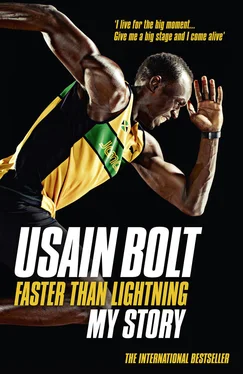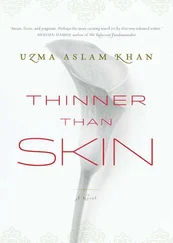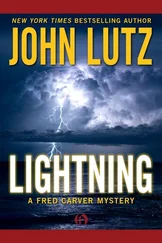Following my victory over Spence, I worked harder in training, but not that much harder. Raw talent was still all I needed to win most races, but I upped my game a little. Sure, there were times when I’d skip training, and as soon as my absence was noticed, Coach McNeil would find me. He would cuss and lecture me as my ass was hauled back to school, but once our work had started at the track, I’d run nearly every lap on his training schedule.
Sometimes hard work wasn’t enough, though. Take Champs at the National Stadium in Kingston for example. When I qualified for my first appearance in 2001 at the age of 14, no running session in the world could have prepared me for that , because it was big, seriously big. I arrived at the event for the first time and my mind blew. The National Stadium was wild, a bowl-shaped arena with a track sunk into the ground and ringed by one vast stand which overflowed with people. It was built for serious competition, and I felt like a serious athlete.
Inside, it was just as I’d imagined from seeing it on the TV and reading about it in the newspapers. The fans were rowdy, everyone was going nuts. It was like being in a big South American football ground, where the supporters were ridiculously passionate. Before each race, as the runners stepped on to the lanes, kids from every school screamed at the top of their lungs and it was impossible to hear anything. I walked into that stadium for my first 200 metres heat and I got a rush from the noise. People banged on drums and played trumpets. The energy it brought to the arena gave me tingles. In that moment, Champs seemed like my Superbowl, Champions League final and Olympic Games rolled into one.
I was racing in Class Two, which was an under-16 event. *That meant I was one of the youngest competitors on the start line, and at that age one or two years could sometimes be quite a disadvantage in terms of physical power and technical ability. I didn’t let it faze me, I was there for the buzz, though anyone looking at the line-up would have thought I was the oldest in the race – I could see over the heads of every rival in the lanes.
A cool head was important at an event like Champs because stress could be a big thing for a lot of high-school athletes. School pride and prestige meant that there was some serious pressure to do well in the competition. A lot of hype was attached to being the school with the best track and field programme in Jamaica, so everybody upped their game. The standard was high. My A-race was going to be needed if William Knibb were to have chance of winning anything.
The competition worked on a team points system, and individual results were combined to determine an overall score, so my contribution would be vital. But there was individual pressure, too. The teachers at William Knibb kept talking about how Champs had been a springboard for success for some of the great Jamaican stars. Don Quarrie, Herb McKenley and the 100 and 200 metre runner Merlene Ottey had all done well at Champs before going on to the world stage. Then there was the promise of a future beyond school: any junior stars of school-leaving age could expect the offer of an athletics scholarship in America, should they shine in the Kingston National Stadium; the younger kids might find their cards marked for future selection.
I wasn’t thinking that far ahead. My excitement was focused solely on the track, the stadium and the fans. But despite my age and inexperience of handling big crowds, there weren’t any nerves, there was no fear. In the 200, I cruised through my heats, into the final and I was hyped – it felt like just another championship meet to me. Bang! When I got out of the blocks, I tore past nearly all of the field, taking a silver medal with a time of 22.04 seconds. The William Knibb fans in the stands went crazy. The whole crowd seemed to be going crazy. It was wild.
With one race, I was on the map. With my second, I was the focus of the country’s athletics fans. I was due to race Jermaine Gonzales †in the 400 metres final, a powerhouse sprinter. Whenever he ran he became a crazy-assed whirlwind of limbs and braided hair. Jermaine was the defending national champ at that time and I knew the cat had game, but I’d also realised there wasn’t a lot between me and him in terms of times, so I’d need to beat him by using brains rather than pure speed in our next 400 metres race.
In recent months I had developed a tactical edge. Like a football coach, I had started planning strategies before meets. As I battled the top kids in Jamaican athletics, I realised that to win I needed to act smart sometimes, so in competitions I found my rivals’ strengths and weaknesses. I watched them in the heats to understand their styles of running and how they attacked a race. Often my first move in any championships was to work out whether I needed to change my game to deal with a strong opponent. Most of the time I knew I’d be quick enough to win on talent alone, but sometimes I used strategy to get to the line in first place.
A week before Champs, NJ and me had sat in the school library to chat tactics. The pair of us had gone to William Knibb together, and while I’d excelled in the brawn department, NJ had been training his mind – he was an A-grade student. But he also understood the art of track and field, he was a sports nut like me, and while the other kids hunched over their books and scribbled into their pads, NJ dissected Jermaine’s sprinting style. We were whispering like spies planning an undercover attack.
‘I know he’s good over 400,’ said NJ. ‘As good as you, but I think you’re the faster 200 metre runner.’
I nodded. ‘OK … And?’
‘VJ, if you attack the first corner hard, and the first half of the 400 too, it’ll psyche him out, especially if you come out of the blocks at the front of the pack. Your good start might panic Jermaine, knock him off his rhythm and force him into over-stretching. That’s when you can take the race, because he’ll lose his technique and you can cruise home.’
At the next championships I stuck to NJ’s tactics and Pow! when the gun popped I moved away from the start line as hard as I could. I was five metres ahead of Jermaine at the corner and as he pushed himself in a desperate attempt to catch up, I heard him cry out. Like NJ predicted, he had panicked, he’d overstretched and pulled a hamstring. All I had to do was burn down the home stretch to first place.
NJ and I felt like masterminds. We later heard that Jermaine had been carrying an injury, but I knew that my attitude to race tactics had helped me to step up. It was a serious learning curve. Afterwards, people talked me up as a contender, a star for the future, and my results in Champs meant that I was eligible to represent Jamaica in the 2001 CARIFTA Games in Barbados. This was a junior competition organised by the Caribbean Free Trade Association every year and held all over the islands in places such as Trinidad and Tobago and Bermuda.
Talk about changing the game. CARIFTA was a competition where the best of the Caribbean junior athletes got together. It was also my first shot at representing the country. But even though I was pulling on a Jamaica running vest in an international event, I still didn’t think anything spectacular was happening. CARIFTA was just another race to me, and I took silver in the 200 metres and set a personal best of 48.28 seconds in the 400.
It was all adventure. Flying to Barbados was the first time I had left Jamaica and, for a while, it felt like a holiday. Then I got homesick and started to miss Mom. One night, as I tried to sleep, I even began crying because I wanted to go home. Back then, I hated the idea of being away from Jamaica for too long. But the Jamaican Amateur Athletic Association (JAAA, or the Jay-3-As ), saw beyond my immaturity and developed a more serious game plan. They had seen some potential in my running style and times, and shortly after Barbados they selected me again, this time to wear Jamaican colours in the International Association of Athletics Federations (IAAF) World Youth Championships in Debrecen, Hungary, and that’s when I damn well nearly freaked out.
Читать дальше












